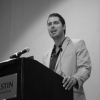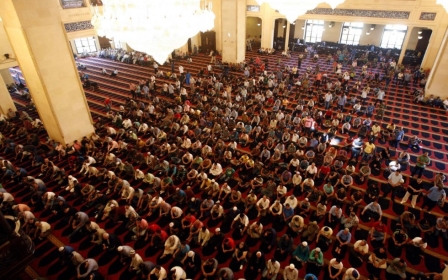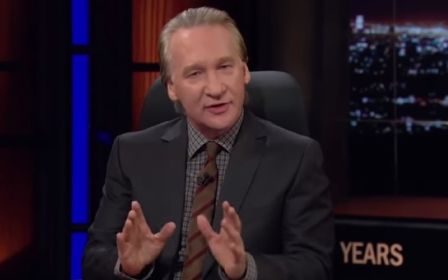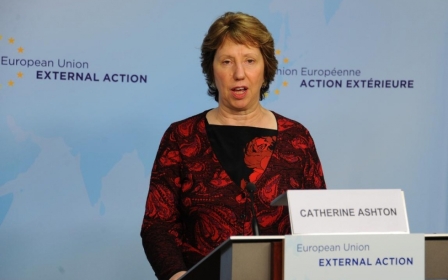Muslim American Apartheid
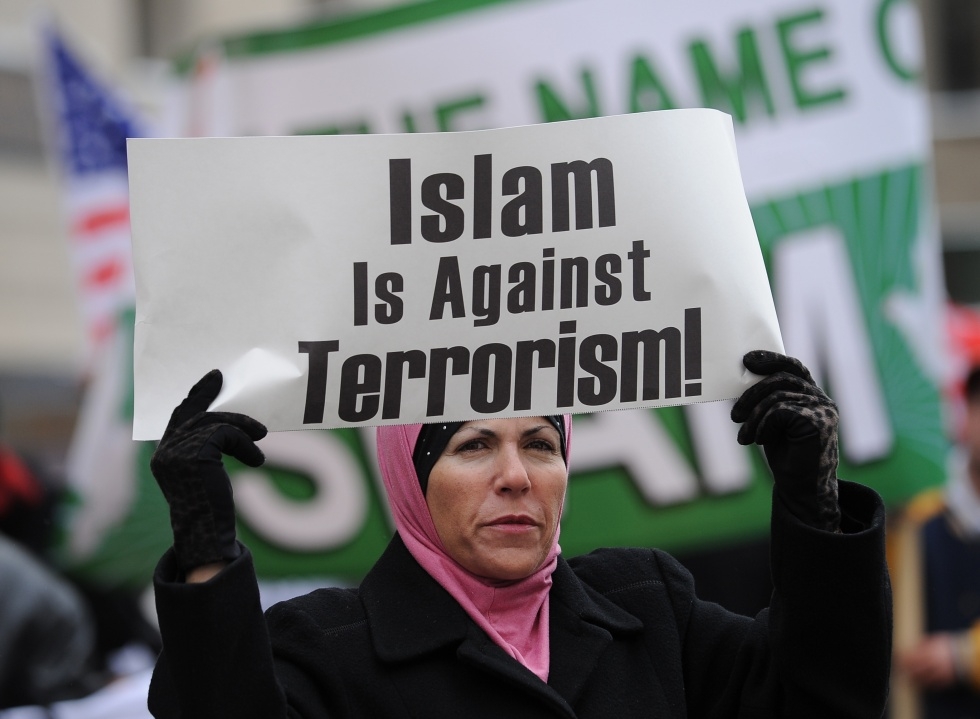
“My parents believed in the promise of a democracy that transcends ethnicity. I still retain that dream, but it is tested every time I go home. I am a citizen of Israel, married to an American Jew, yet I am not welcome in Israel. For I am Palestinian,” is what Rula Jebreal wrote in a recent NY Times op-ed.
Jebreal recounts her recent return visit to the country of her birth. Upon arriving at Tel Aviv’s Ben-Gurion airport, she tells of how both her and her 17-year-old daughter were forced to suffer the humiliation of being strip-searched. “I’m inured to the procedure: I have to endure it almost every time I enter and leave the country. But our daughter, age 17, sobbed with chagrin. ‘This place breeds hate everywhere!’ she cried.”
Earlier this year Secretary of State John Kerry warned that Israel risks becoming an “apartheid state”. It wasn’t that long ago that US President Carter said Israel’s “apartheid policies are worse than [1980s] South Africa”.
The ‘social white card’
Question: when it comes to its treatment of Muslim and Arab citizens, is life in the United States any better for those of the Muslim faith and/or those of “Middle Eastern appearance”?
To answer that question, one must first contrast the pre-9/11 era with the post-9/11 period.
Prior to 9/11, Muslim-Americans were typically viewed by white Americans as model Asian minorities, and as Dawud Walid, a Muslim activist in Detroit, notes, “Were right at the door of what’s called ‘whiteness’ in America.” He adds that, “Whiteness in America doesn’t mean skin colour. It’s a level of assimilation and social fluidity. Even on the census, Arabs are considered white. But now socially they’re not white any more – 9/11 took away their social white card.”
The “social white card” has always been given and taken away by the whims of the general public. Arun Kundani, adjunct professor at New York University, notes that in the 1940s “when [US] Arab organisations turned to the question of Palestine, they quickly lost their whiteness and came to be seen as dangerous aliens.”
Dean Obeidallah, an Arab-American comedian and columnist for the Daily Beast, is one of this country’s most eloquent speakers when it comes to describing the “Muslim experience” in America today. “It’s so weird. Before 9/11, I am just a white guy, living a typical white guy’s life. All my friends had names like Monica, Chandler, Joey, and Ross. I go to bed September 10 white, wake up September 11, I am an Arab,” Obeidallah joked.
There’s an unwritten post-9/11 law that says Muslim-Americans are forbidden from identifying with the victims of US-sponsored violence in Muslim majority countries. “To be classified as moderate Muslims they must forget what they know about Palestine, Iraq, and Afghanistan, and instead align themselves with the fantasies of the war on terror; they are expected to constrain their religion to the private sphere but also speak out publicly against extremists’ interpretations of Islam; they are supposed to see themselves as liberal individuals but also declare an allegiance to the national collective; they are meant to put their faith capacity for reason above blind faith but not let it lead to criticisms of the West; and they have to publicly condemn using violence to achieve political ends – except when their own governments do so. No wonder moderate Muslims are said to be so hard to find,” writes Kundnani
Moderate Muslims shouldn’t be so hard to find given polls suggest an overwhelming majority are “moderate” when it comes to the interpretation of their faith. But despite the fact only a minority of Muslim-Americans – less than 40 percent – attend a weekly mosque service; that an overwhelming majority have a secular outlook; that a 2011 Pew Research Poll found “no evidence of rising support for Islamic extremism among Muslim-Americans”; and that Pew Research also found that “a majority of Muslim-Americans (56 percent) say that most Muslims who come to the US want to adopt American customs and ways of life,” and that nearly half of Muslims in the US (49 percent) say they think of themselves as a Muslim first, and an American second, which is exactly how an equal number (46 percent) of US Christians see themselves (Christian first, American second), Muslim-Americans are viewed by an ever increasingly fearful US public as potential suicide bombers in waiting.
A 2014 Pew Forum Poll found that Muslims are the most disliked minority in America, while a survey conducted by Zogby Analytics found that 42 percent of Americans believe “law enforcement is justified in using profiling tactics against Muslim-Americans and Arab-Americans”.
Bad policies
This is where bad attitudes lead to bad policies. Law enforcement policies, for instance, often tiptoe the line separating civil liberties and apartheid, especially when policies of surveillance, profiling, and harassment are viewed through the lens of the US constitution.
Today, Muslim-Americans must endure harassment from both law enforcement officials and the general public. According to FBI statistics, anti-Muslim violence has soared since 2010. “The statistical trend of an upsurge from 2010 is consistent with a worsening Islamophobic mood in America’s political culture – from anti-mosque campaigns, to mobilisations to ban sharia law, to the stigmatisation of President Obama as a secret Muslim, to high-profile congressional hearings on the radicalisation of American Muslims,” writes Kundnani.
For many Muslim-Americans, the country of their citizenship resembles a proto-totalitarian state, with threats of deportation for those who reject government “invitations” to become FBI informants; the humiliation of ethnic profiling, and the invasiveness of round-the-clock surveillance. Tens of thousands are put on government no-fly lists without reason given. Mosques and mostly Muslim neighbourhoods are infiltrated with both undercover agents, and those paid by law enforcement for ad hoc information. According to the Senate Intelligence Committee, the FBI has more than 10,000 intelligence analysts and 15,000 paid informants dedicated to combating homegrown Muslim terrorism. Given there are an estimated 2.4 million Muslims living in America, this would mean there is an FBI spy for every 96 Muslims living in the US. To put this into perspective, the East German totalitarian state is estimated to have had one Stasi agent for every 166 of its citizens.
Earlier this year, investigative journalist Glenn Greenwald published secret government documents that showed the NSA and FBI had unlawfully “snooped on the emails of five high-profile Muslim-Americans”. Those targeted included a Rutgers University professor; a lawyer, a political science professor at California State University, a former Department of Homeland Security employee, and the executive director of the Council on American-Islam Relations.
Such heavy-handed and unjustifiable surveillance leads Muslim communities with no other alternative but to retreat into self-censorship, which is, in itself, an imposed restriction of free speech. In Mapping Muslims: NYPD Spying and its Impact on American Muslims, the authors interview Linda Sarsour, an Arab-American community activist in New York. “We’re Arabs, we talk about politics all the time. Politics is all we do! Every coffee shop, it’s either Al-Jazeera or a soccer game on TV. This new idea that we must be suspicious of those who speak about politics – something’s wrong,” Sarsour says.
There are many cases where law enforcement officials have baited Muslims into making inflammatory remarks against the US. This policing strategy is called “create and capture”, which involves “initiating conversations about jihad or terrorism, then capturing the response and sending it” to counter-terrorism officials. Other cases have revealed that FBI agents have “manipulated vulnerable people with mental health or drug-addiction problems into conspiring in acts of planned violence they would have otherwise have had no intention of planning out.”
Martin Stolar, a lawyer who represented a man caught in a 2004 sting involving New York’s Herald Square subway station, said, “They’re creating crimes to solve crimes so they [FBI] can claim a victory in the war on terror.”
Given there hasn’t been a foreign planned and funded attack on US soil since 9/11, yet hate crimes and civil liberties violations against Muslim-Americans continue to climb, the question then becomes: what happens to the 99.99% of the 2.4 million non-radicalised, non-violent Muslim-Americans the day after the next catastrophic terrorist attack?
If that question requires a clue: the day after the Ottawa, Canada attack, which left one Canadian soldier dead, congressman Peter King called for all-out surveillance on Muslim communities. “With Isis making a concerted effort to bring about these domestic attacks we have to go all out with surveillance,” he said. “We have to monitor what’s happening in those communities and we have to be quick to call it terrorism.”
While King is no stranger to histrionics, it’s clear another catastrophic terrorist attack on US soil will inevitably set America on the path Israel has chosen – a path that has led the Jewish state to enact more than 50 discriminatory laws, which “discriminate against Palestinian citizens of Israel in all areas of life, including their rights to political participation, access to land, education, state budget resources, and criminal procedures.”
Given the US government unhesitatingly violated the civil liberties of those who had Japanese, German, or Italian ancestry during the second world war thus creating a quasi-apartheid state for hundreds of thousands of innocent, yet branded, “enemy aliens”, it’s not difficult to follow the above trends to their natural conclusion: another major terror attack will most likely mean the establishment of the US apartheid state.
- CJ Werleman is an opinion writer for Salon, Alternet, and the author of Crucifying America, and God Hates You. Hate Him Back. Follow him on twitter: @cjwerleman
The views expressed in this article belong to the author and do not necessarily reflect the editorial policy of Middle East Eye.
Photo: Muslim Americans protest against terrorism outside Federal Court before the arraignment of Nigerian bombing suspect Umar Farouk Abdulmutallab on 8 January, 2010 in Detroit
New MEE newsletter: Jerusalem Dispatch
Sign up to get the latest insights and analysis on Israel-Palestine, alongside Turkey Unpacked and other MEE newsletters
Middle East Eye delivers independent and unrivalled coverage and analysis of the Middle East, North Africa and beyond. To learn more about republishing this content and the associated fees, please fill out this form. More about MEE can be found here.


